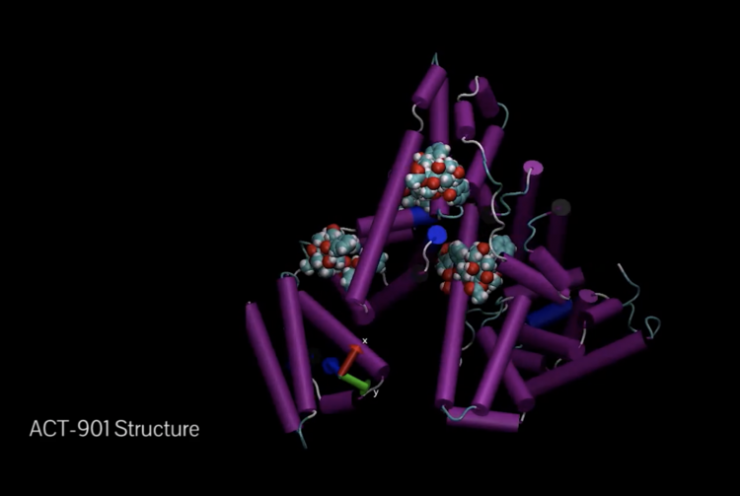Closely held Alpha Cancer Technologies, which is going public in a reverse takeover of Bradmer Pharmaceuticals (TSX-V:BMR-H), plans to begin testing patients with ovarian cancer this year with its drug candidate, ACT-901, which features a novel targeted drug delivery platform.
BioTuesdays.com had an opportunity to interview the company’s founder & CEO, Dr. Igor Sherman, and its chairman, Richard Potts.
“Our lead asset, ACT-901, combines alpha fetoprotein (AFP), a well-tested and safe transporter protein, with paclitaxel, a generic chemotherapy drug, with a well established efficacy profile,” Dr. Sherman says.
“The combination only targets cancer cells to deliver its chemotherapy payload,” he adds, pointing out that more than 80% of solid and liquid cancer cells have the AFP receptor on the cell surface.
Dr. Sherman explains that healthy cells do not carry the AFP receptor, so ACT-901 does not target healthy cells. As a result, paclitaxel’s toxicity is greatly reduced and the targeted killing of cancer cells is significantly increased.
“Lower toxicity also offers the ability to treat the patient more frequently, killing cancer cells even in many chemotherapy resistant tumors,” he says. “We believe our targeted approach has the potential to be a very significant advance in the treatment of cancer.”
AFP is a carrier protein known for transporting nutrients to rapidly growing fetal cells. Only trace amounts of the protein are found following birth, but importantly, receptors for AFP show up again on cancer cells to help shuttle nutrients to rapidly growing cancer cells.
Toronto-based Alpha Cancer holds the exclusive worldwide rights to recombinant human AFP (rHuAFP) that it acquired from Merrimack Pharmaceuticals (NASDAQ:MACK), which was unsuccessful in using unmodified rHuAFP for the treatment of certain autoimmune diseases.
Merrimack, which held some 20 international patents on the technology, spent more than $100-million to develop its AFP, treating more than 400 patients in numerous Phase 1 and 2 clinical trials. It also generated a large drug master file, including data on manufacturing, toxicology and human safety, which was submitted to the FDA.
“Leveraging the work that Merrimack has done, we have a significantly mitigated risk profile and an expedited clinical development path forward with ACT-901,” Mr. Potts contends.
In collaboration with researchers at the University Health Network and the Ontario Cancer Institute/Princess Margaret Cancer Centre in Toronto, Alpha Cancer has completed preliminary in vitro and in vivo pre-clinical studies examining the activity, safety and efficacy of ACT-901.
“These studies offer compelling support for the improved ability of ACT-901 to inhibit tumor growth and improve survival, compared with free paclitaxel,” Dr. Sherman says.
Mr. Potts points out that ACT-901 can be viewed as a third generation paclitaxel therapy, following the original Taxol and Celgene’s (NASDAQ:CELG) Abraxane, which is a combination of albumin and paclitaxel. Abraxane had 2013 sales of $650-million. “In many respects, we consider ACT-901 to be a targeted version of Abraxane,” he adds.
Alpha Cancer hopes to schedule an investigational new drug (IND) meeting with the FDA and apply for orphan drug designation in the first half this year as a stepping stone for a planned Phase 1 ovarian cancer study with ACT-901 before the end of this year.
The company received a huge vote of confidence when it attracted Dr. Daniel Von Hoff, an influential expert in cancer drug development, to be its principal investigator. Dr. Von Hoff has been involved in over 200 cancer trials and was the principal investigator for the approval of the original paclitaxel and Abraxane. He has agreed to help with the design and conduct of Alpha Cancer’s clinical trials for ACT-901.
“This will not be a typical Phase 1 study because we know AFP is safe and paclitaxel is a generic drug with known efficacy,” Dr. Sherman suggests. “Rather than test for toxicity, we hope to receive FDA approval to start treating cancer patients with an efficacious dose in the trial.” The 14-month study will treat an estimated 35 patients.
By targeting an orphan disease population, Alpha Cancer hopes to launch ACT-901 in the U.S. and Europe for ovarian cancer under expedited commercial approval after it completes a randomized Phase 2 study that would begin immediately following the Phase 1 study.
Co-development and co-marketing deals with Big Pharma could facilitate post-marketing Phase 3 trials in additional indications, such as lung and prostate cancer.
Mr. Potts says that in connection with its reverse takeover of Bradmer Pharmaceuticals, Alpha Cancer is in the process of raising $7-million to $10-million through a private placement. Euro Pacific Canada is acting as agent for part of the private placement. The pricing of the private placement reflects a pre-market enterprise value of the company of $25-million.
About $7-million of the financing proceeds would be used for an IND filing and a Phase 1 study. Alpha Cancer estimates that it would likely need to raise another $18-million for a Phase 2 study and to begin the process of commercialization.
In discussing the current state of medicine, Mr. Potts cites statistics from the U.S. National Center for Health that between 1960 and 2009, age-adjusted death rates in heart disease and cerebro-vascular disease declined significantly, but in cancer, they are almost unchanged. “That’s why we’re so excited that we have a potential game changer in cancer treatment.”






